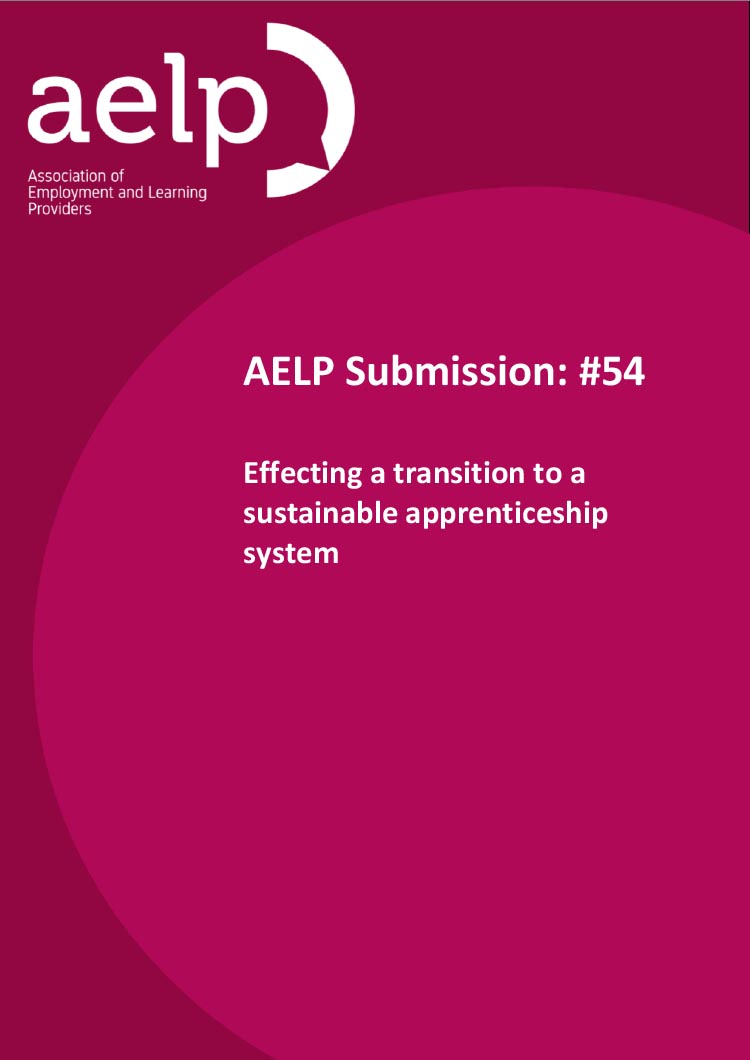Party conferences must focus on social mobility

One of the nicer aspects of working in FE and skills is that we are in a sector where there is normally a cross-party political consensus on the objectives that we should be pursuing.
This makes eight days attending the two main party conferences a more pleasant experience than might be imagined when trailling between fringe venues in autumnal weather.
This year though the consensus might show signs of fracture.
Labour will obviously seize on the IFS’s recent findings on real terms funding for 16 to 19 provision and questions will be asked whether the current government’s championing of social mobility amounts to more than just words.
AELP certainly believes that the implementation of the apprenticeship levy reforms are seriously undermining social mobility in the sense that young people, smaller businesses and rural areas are all suffering from a big drop in the availability of places on the government’s flagship skills programme.
Level 2 apprenticeships have halved in number compared with two years ago and young people considering doing an apprenticeship after completing their GCSEs this summer faced a 41% decrease in the number of opportunities available to them.
Despite ministers’ inaction, we still feel that the situation is easily redeemable.
In our view, the apprenticeships of all 16-18 year olds should be fully funded by the government whatever the size of the employer or level of learning. Level 2 and level 3 programmes should also be fully funded for all apprentices under the age of 25.
In the interests of social mobility, these policies should be implemented as soon as possible. The urgency is underlined by the outcome from Salzburg with the hills being alive to the sound of ‘How do you solve a problem like Brexit’, especially as the Migration Advisory Committee is now advising ministers to allow no special treatment for UK firms to employ lower skilled EEA workers.
If the committee’s recommendations are accepted, they would place more demand on employers to develop home-grown talent – another reason for the need to take action now on level 2 and 3 apprenticeships.
When we say earning while learning is a big attraction for a young person to do an apprenticeship, it should be true and it is certainly the case that the vast majority of employers pay at rates above the minimum apprentice wage.
This is why the Low Pay Commission should recommend to ministers that it’s now time for the apprentice rate to go and instead apprentices should be on the same rate as the other national minimum wage rates for young people and over 25s.
The government has delayed for at least a year the introduction of the next phase of the apprenticeship reforms and this does at least give everyone a little time to come up with a template for an enlarged Apprenticeship Service (AS) which ensures that apprenticeships really can make a major difference on the social mobility front.
Effecting a transition to a sustainable apprenticeship system
 AELP has submitted to ministers its own set of proposals to effect a smooth transition of the smaller non-levy paying employers on to the service and while we stand by our call for a stand-alone £1bn annual apprenticeship budget for SMEs, we recognise that demand from all employers may have to be managed within the overall levy budget of £2.6bn.
AELP has submitted to ministers its own set of proposals to effect a smooth transition of the smaller non-levy paying employers on to the service and while we stand by our call for a stand-alone £1bn annual apprenticeship budget for SMEs, we recognise that demand from all employers may have to be managed within the overall levy budget of £2.6bn.
This means designing a system that is fair to employers of all sizes while rebalancing it to meet social mobility objectives. The way to do this is to move from the current 10% employer financial contribution, the so-called co-investment, required from non-levy employers for all levels of apprenticeship to an increasing rate of contribution paid by all employers for each higher level.
Our submission sets out the proposals in detail but in a nutshell, we would be looking at apprenticeships being fully funded by the government at level 2 and then starting at 10% for level 3, employer contributions would increase up to 50% at levels 6 and 7.
It is worth reiterating again that AELP strongly supports the introduction of degree apprenticeships as a game-changing opportunity but in the interests of social mobility, the way that they are currently funded has to be reviewed. Otherwise nearly the whole of the levy will be consumed by higher level provision.
Adopting the AELP proposals could result in a more even spread of demand and lead to spare levy money. The remaining levy, or other funding, can then be used to incentivise against government priorities – national, regional and local, by sector or level or type of apprentice.
For example, a desire to drive up the number of healthcare workers at level 3 and 4 could be incentivised by the employer contribution being removed for 12 months in that sector.
Quality not Quantity
As ministers only want to talk about the quality of apprenticeships from now on instead of quantity, they need to have a conversation with the Institute for Apprenticeships about the latter becoming more transparent and genuinely focused on enhancing quality.
At the moment the priority seems to be switching to cut-price apprenticeships, no matter the impact on quality.
The latest AELP submission argues for a more robust and refreshed Register of Apprenticeship Training Providers which acts as the gateway to apprenticeship funding for all employers and as an assurance for employers that they are using a high quality training provider.
Being serious about quality also means acting on the sector’s genuine warnings that we are heading for a very large car crash on end point assessment (EPA).
As the numbers rolling off the new standards increase, apprentices are facing a severe shortage in assessor capacity, made worse by employers looking at the costs of EPA and the external assurance arrangements, and not liking what they see. And of course if people start cutting corners on quality, it’s providers that will get the blame and not the policymakers who have been warned about this for over two years.
What a way to treat a young person who has worked hard to complete an otherwise high quality work based learning programme.
This is social mobility being stopped in its tracks and this is what the politicians have to rectify over the remaining autumn months.
Mark Dawe, Chief Executive, the Association of Employment and Learning Providers (AELP)











Responses